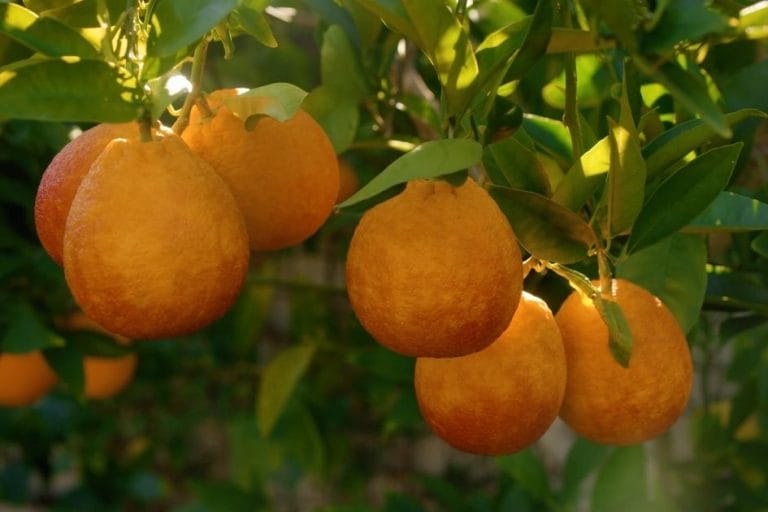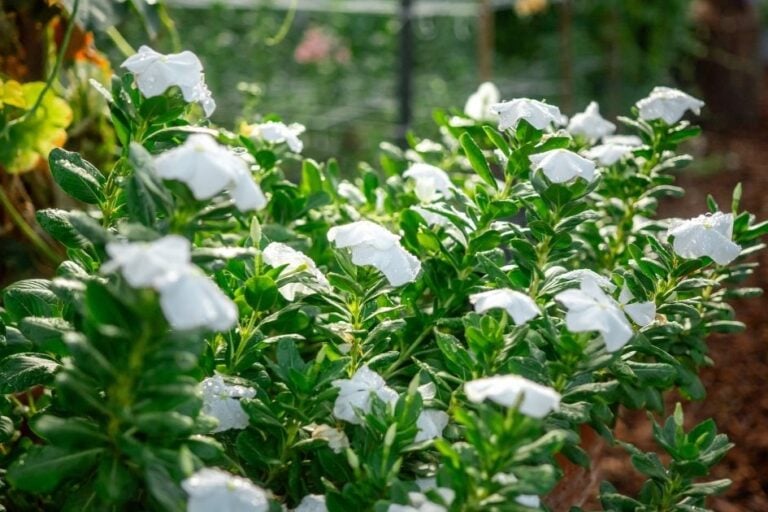How to Grow Passion Flower Vine
The prolific vines of Passion Flowers produce elaborate flowers. The vines and flowers of this warm-region perennial vine attract pollinators and are a host plant for Gulf Fritillary Butterflies. Learn how to grow Passion Flower Vine, when to harvest the fruit, and how to save Passion Flower seeds so you can add it to your garden.

Passiflora caerulea, commonly known as the Blue Passion Flower, is a beautiful and exotic vine that can add a unique touch to any garden. While native to South America, it has quickly become a favorite among gardeners everywhere (including me).
Passion Flower Vine (Passiflora caerulea)

This is what Passion Flower Vine seeds look like. Click here for seeds.

Passion Flower Vine growing on a trellis.

This is what Passion Flower Vine flowers look like.

Passion Flower Vine fruit.
How to grow Passion Flower Vine

Passion Flower Vine planting information:
Direct sow seeds or start indoors 6-8 weeks prior to planting in the spring or fall. Plant seeds ¼” deep.
- Seeds may take some time to germinate; be patient and keep soil hydrated.
- Prefers full sun and deep, well-drained, rich soil.
- Moderate moisture requirements can be somewhat drought-tolerant.
Size and spacing details for Passion Flower Vine:
Plant seeds and/or transplants 5 feet (1.5 m) apart.
Grows to 15-30 feet (4.5-9m) tall; provide a trellis for the long vines.

Passion Flower Vine growing tips:
Grows best in full sun. Water deeply. Allow the top several inches of soil to dry out before watering again. Mulch soil well. In my low desert Arizona garden, I provide shade during the hottest months of the year.

What about Gulf Fritillary Caterpillars?

Gulf Fritillary Butterflies love Passion Flower Vines. I love having a garden full of butterflies, and this is one of the reasons I grow this vine. The caterpillars may overtake the vine and cause severe damage. I allow this to happen and don’t intervene.
The Gulf Fritillary Butterfly and the Passion Flower Vine (Passiflora caerulea) share a fascinating yet intricate symbiotic relationship, demonstrating nature’s delicate balance.

The Passion Flower Vine is a host plant to the Gulf Fritillary Butterfly, providing a site for these butterflies to lay their eggs. Though this process may cause damage to the vine, it plays an essential role in the life cycle of the butterfly.
Once the eggs hatch, the emerging larvae feed on the vine. This process, while seemingly destructive, is a crucial part of their growth and development. Despite the harm, the vine often continues to flourish, demonstrating its resilience.

Although the vine is damaged, as the adult butterflies move from flower to flower, seeking nectar, they inadvertently facilitate pollination, helping the plant reproduce. This mutualistic relationship underscores the interconnectedness of ecosystems and the importance of each species’ role in promoting biodiversity.
Passion Flower Vine harvesting tips:

Flowers form first and then develop into fruit. Harvest the fruit when it is yellow or orange in color. The fruit should be soft to the touch. Allow harvested fruit to ripen for a few days at room temperature.
The fruit of the Blue Passion Flower is edible but not especially tasty. We like other varieties of passionfruit much better. My chickens, however, love to eat the fruit. Once harvested, the fruit should be kept in a cool, dry place.
How to save Passion Flower Vine seeds:

I like saving the seeds from Passion Flower to plant again and share with others. Here’s how to do it:
- Extract the Seeds: Start by extracting the seeds from a ripe passion fruit. Cut the fruit open and scoop out the pulp, which contains the seeds.
- Begin Fermentation: Place the pulp and seeds into a small, transparent container. Add just enough water to cover the seeds and loosely cover the container. Leave this in a warm place.
- Wait for Mold: Over the next 3-7 days, a layer of mold will form on the surface. This is a positive sign as it indicates the fermentation process is underway. The fermentation process helps to break down the hard seed coat and remove any germination inhibitors.
- Rinse and Dry: Once the seeds have fermented, rinse them thoroughly under running water using a fine strainer. After rinsing, spread the seeds out to dry in a well-ventilated area away from direct sunlight.
- Store Properly: Store the dried seeds in a cool, dry place until you’re ready to plant them next season. A paper envelope or a glass jar with a good seal works well for storage.

Fermenting Passion Flower seeds has several benefits. It mimics the natural process if the fruit fell to the ground and decomposed naturally. The fermentation process can also help to protect the seeds from diseases and improve their overall health. As a result, you will be more likely to have strong, healthy plants in the coming growing season.
Are you looking for more information about how to grow vines?

This is just one of 10 vines that grow well from seed. Learn more about my other favorites in this blog post.
This Arizona Vine Planting Guide shares some of my favorite vines that grow well in Arizona and gives growing and planting details for each one.


Looking for ways to add vertical space to your garden? This post shares 10 of my favorite ideas.

In this blog post, find more ways to add vertical space to your garden.









Hi,
Is it too late to plant passion flower seeds in Phoenix?
You could certainly try – it’s a pretty tough plant.
On the passionflower you say it “ Prefers full sun and deep, well-drained, rich soil. but then you say “Overly rich soil results in fewer blooms. Pruning promotes flowers.” So which is it, rich soil or not??
Good point. I adjusted the post based on my most recent growing experience. I grew in my raised beds with good soil amended with compost and had plenty of blooms.
I purchased passionflower seeds that say to soak the seeds for 24 hours before planting. But you mention directly sowing them. I haven’t had much luck with soaking them overnight so wanted to know if there is a trick to getting them to sprout. I’m in east Mesa also. Thanks!
I didn’t soak my seeds. I have better luck when I don’t soak seeds. Be patient and keep them moist. I often had seeds self-sow in the garden from dropped fruit.
Could you specify which varieties of passionfruit your family enjoys much better than the fruit of the Blue Passion Flower?
Passiflora edulis